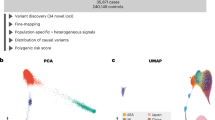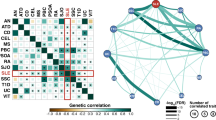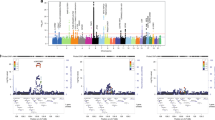Abstract
Rheumatoid arthritis is a common autoimmune disease characterized by chronic inflammation. We report a meta-analysis of genome-wide association studies (GWAS) in a Japanese population including 4,074 individuals with rheumatoid arthritis (cases) and 16,891 controls, followed by a replication in 5,277 rheumatoid arthritis cases and 21,684 controls. Our study identified nine loci newly associated with rheumatoid arthritis at a threshold of P < 5.0 × 10−8, including B3GNT2, ANXA3, CSF2, CD83, NFKBIE, ARID5B, PDE2A-ARAP1, PLD4 and PTPN2. ANXA3 was also associated with susceptibility to systemic lupus erythematosus (P = 0.0040), and B3GNT2 and ARID5B were associated with Graves' disease (P = 3.5 × 10−4 and 2.9 × 10−4, respectively). We conducted a multi-ancestry comparative analysis with a previous meta-analysis in individuals of European descent (5,539 rheumatoid arthritis cases and 20,169 controls). This provided evidence of shared genetic risks of rheumatoid arthritis between the populations.
This is a preview of subscription content, access via your institution
Access options
Subscribe to this journal
Receive 12 print issues and online access
$209.00 per year
only $17.42 per issue
Buy this article
- Purchase on Springer Link
- Instant access to full article PDF
Prices may be subject to local taxes which are calculated during checkout



Similar content being viewed by others
References
Suzuki, A. et al. Functional haplotypes of PADI4, encoding citrullinating enzyme peptidylarginine deiminase 4, are associated with rheumatoid arthritis. Nat. Genet. 34, 395–402 (2003).
Kochi, Y. et al. A functional variant in FCRL3, encoding Fc receptor–like 3, is associated with rheumatoid arthritis and several autoimmunities. Nat. Genet. 37, 478–485 (2005).
The Wellcome Trust Case Control Consortium. Genome-wide association study of 14,000 cases of seven common diseases and 3,000 shared controls. Nature 447, 661–678 (2007).
Remmers, E.F. et al. STAT4 and the risk of rheumatoid arthritis and systemic lupus erythematosus. N. Engl. J. Med. 357, 977–986 (2007).
Plenge, R.M. et al. TRAF1–C5 as a risk locus for rheumatoid arthritis—a genomewide study. N. Engl. J. Med. 357, 1199–1209 (2007).
Plenge, R.M. et al. Two independent alleles at 6q23 associated with risk of rheumatoid arthritis. Nat. Genet. 39, 1477–1482 (2007).
Barton, A. et al. Rheumatoid arthritis susceptibility loci at chromosomes 10p15, 12q13 and 22q13. Nat. Genet. 40, 1156–1159 (2008).
Suzuki, A. et al. Functional SNPs in CD244 increase the risk of rheumatoid arthritis in a Japanese population. Nat. Genet. 40, 1224–1229 (2008).
Gregersen, P.K. et al. REL, encoding a member of the NF-κB family of transcription factors, is a newly defined risk locus for rheumatoid arthritis. Nat. Genet. 41, 820–823 (2009).
Kochi, Y. et al. A regulatory variant in CCR6 is associated with rheumatoid arthritis susceptibility. Nat. Genet. 42, 515–519 (2010).
Freudenberg, J. et al. Genome-wide association study of rheumatoid arthritis in Koreans: population-specific loci as well as overlap with European susceptibility loci. Arthritis Rheum. 63, 884–893 (2011).
Terao, C. et al. The human AIRE gene at chromosome 21q22 is a genetic determinant for the predisposition to rheumatoid arthritis in Japanese population. Hum. Mol. Genet. 20, 2680–2685 (2011).
Raychaudhuri, S. et al. Common variants at CD40 and other loci confer risk of rheumatoid arthritis. Nat. Genet. 40, 1216–1223 (2008).
Raychaudhuri, S. et al. Genetic variants at CD28, PRDM1 and CD2/CD58 are associated with rheumatoid arthritis risk. Nat. Genet. 41, 1313–1318 (2009).
Stahl, E.A. et al. Genome-wide association study meta-analysis identifies seven new rheumatoid arthritis risk loci. Nat. Genet. 42, 508–514 (2010).
Zhernakova, A. et al. Meta-analysis of genome-wide association studies in celiac disease and rheumatoid arthritis identifies fourteen non-HLA shared loci. PLoS Genet. 7, e1002004 (2011).
Kurreeman, F. et al. Genetic basis of autoantibody positive and negative rheumatoid arthritis risk in a multi-ethnic cohort derived from electronic health records. Am. J. Hum. Genet. 88, 57–69 (2011).
Nakamura, Y. The BioBank Japan Project. Clin. Adv. Hematol. Oncol. 5, 696–697 (2007).
Yamanaka, H. et al. Influence of methotrexate dose on its efficacy and safety in rheumatoid arthritis patients: evidence based on the variety of prescribing approaches among practicing Japanese rheumatologists in a single institute-based large observational cohort (IORRA). Mod. Rheumatol. 17, 98–105 (2007).
Yamada, R. et al. Association between a single-nucleotide polymorphism in the promoter of the human interleukin-3 gene and rheumatoid arthritis in Japanese patients, and maximum-likelihood estimation of combinatorial effect that two genetic loci have on susceptibility to the disease. Am. J. Hum. Genet. 68, 674–685 (2001).
Tokuhiro, S. et al. An intronic SNP in a RUNX1 binding site of SLC22A4, encoding an organic cation transporter, is associated with rheumatoid arthritis. Nat. Genet. 35, 341–348 (2003).
Okada, Y. et al. A genome-wide association study identified AFF1 as a susceptibility locus for systemic lupus eyrthematosus in Japanese. PLoS Genet. 8, e1002455 (2012).
Stranger, B.E., Stahl, E.A. & Raj, T. Progress and promise of genome-wide association studies for human complex trait genetics. Genetics 187, 367–383 (2011).
Shimane, K. et al. A single nucleotide polymorphism in the IRF5 promoter region is associated with susceptibility to rheumatoid arthritis in the Japanese patients. Ann. Rheum. Dis. 68, 377–383 (2009).
Okada, Y. et al. Identification of nine novel loci associated with white blood cell subtypes in a Japanese population. PLoS Genet. 7, e1002067 (2011).
de Bakker, P.I. et al. Practical aspects of imputation-driven meta-analysis of genome-wide association studies. Hum. Mol. Genet. 17, R122–R128 (2008).
Stranger, B.E. et al. Population genomics of human gene expression. Nat. Genet. 39, 1217–1224 (2007).
Okada, Y. et al. Contribution of a haplotype in the HLA region to anti–cyclic citrullinated peptide antibody positivity in rheumatoid arthritis, independently of HLA-DRB1. Arthritis Rheum. 60, 3582–3590 (2009).
Acknowledgements
The authors acknowledge the essential role of the GARNET consortium in developing the study. In this study, the following GARNET members are included: CGM of RIKEN, University of Tokyo, the BioBank Japan Project, Kyoto University and IORRA. We would like to thank all the doctors and staff who participated in sample collection for the RIKEN cohort and the BioBank Japan Project. We thank K. Kobayashi and M. Kitazato for their technical assistance. We thank T. Raj for calculation of composite of multiple signals (CMS). We thank M. Kokubo for DNA extraction, GWAS genotyping and secretarial assistance. We would also like to thank H. Yoshifuji, N. Yukawa, D. Kawabata, T. Nojima, T. Usui and T. Fujii for collecting DNA samples. We thank Y. Katagiri for her technical efforts. We also appreciate the contribution of E. Inoue and other members of the Institute of Rheumatology, Tokyo Women's Medical University, for their efforts on the IORRA cohort. This study was supported in part by grants-in-aid from the Ministry of Education, Culture, Sports, Science and Technology (MEXT) in Japan, the Ministry of Health, Labour and Welfare (MHLW) in Japan, the Japan Society for the Promotion of Science (JSPS), Core Research for Evolutional Science and Technology (CREST), Solution-Oriented Research for Science and Technology (SORST), INSERM and the Okawa Foundation for Information and Telecommunications.
Author information
Authors and Affiliations
Contributions
Y. Okada, C.T., K.I., Y. Kochi and K.O. designed the study and drafted the manuscript. Y. Okada, C.T., K.I., T.K., H.O., N.N., M.T., M.L., K. Tokunaga and M.K. managed genotyping and manipulation of GWAS data. Y. Okada, Y. Kochi, C.T. and K.I. managed genotyping of replication cohorts. Y. Okada, T.K., H.O., E.A.S., A. Takahashi and R.Y. performed statistical analysis. Y. Kochi, A.S., K. Myouzen, T. Sawada, Y. Nishoka, M.Y., T. Matsubara, S.W., R.T. and S.T. collected samples and managed phenotype data for the rheumatoid arthritis cohorts from the BioBank Japan Project and CGM, RIKEN. C.T., K.O., T.K., M.T., K. Takasugi, K.S., A.M., S.H., K. Matsuo, H. Tanaka, K. Tajima and M.L. collected samples and managed phenotype data for the rheumatoid arthritis cohorts from Kyoto University. K.I., T. Suzuki, T.I., Y. Kawamura, H. Tanii, Y. Okazaki and T. Sakaki collected samples and managed phenotype data for the rheumatoid arthritis cohorts from IORRA. Y. Kochi managed the data for the SLE and Graves' disease cohorts. A.S., C.T. and K.I. analyzed the sera of subjects with rheumatoid arthritis. E.A.S., F.A.S.K., P.K.G., J.W., K.A.S., L.P. and R.M.P. managed the data for the rheumatoid arthritis cohorts in European populations. A. Taniguchi, A. Takahashi, K. Tokunaga, M.K., Y. Nakamura, N.K., T. Minori, R.M.P., H.Y., S.M., R.Y., F.M. and K.Y. supervised the overall study.
Corresponding authors
Ethics declarations
Competing interests
The authors declare no competing financial interests.
Supplementary information
Supplementary Text and Figures
Supplementary Tables 1–6, Supplementary Figures 1–3 and Supplementary Note (PDF 552 kb)
Rights and permissions
About this article
Cite this article
Okada, Y., Terao, C., Ikari, K. et al. Meta-analysis identifies nine new loci associated with rheumatoid arthritis in the Japanese population. Nat Genet 44, 511–516 (2012). https://doi.org/10.1038/ng.2231
Received:
Accepted:
Published:
Issue Date:
DOI: https://doi.org/10.1038/ng.2231
This article is cited by
-
ARID3a from the ARID family: structure, role in autoimmune diseases and drug discovery
Acta Pharmacologica Sinica (2023)
-
Genetic analyses identify pleiotropy and causality for blood proteins and highlight Wnt/β-catenin signalling in migraine
Nature Communications (2022)
-
CRISPR activation screen identifies BCL-2 proteins and B3GNT2 as drivers of cancer resistance to T cell-mediated cytotoxicity
Nature Communications (2022)
-
Cleavage of DNA and RNA by PLD3 and PLD4 limits autoinflammatory triggering by multiple sensors
Nature Communications (2021)
-
Self-reactive T cells induce and perpetuate chronic relapsing arthritis
Arthritis Research & Therapy (2020)



